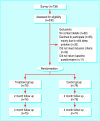Randomised controlled trial of behavioural infant sleep intervention to improve infant sleep and maternal mood
- PMID: 11991909
- PMCID: PMC104332
- DOI: 10.1136/bmj.324.7345.1062
Randomised controlled trial of behavioural infant sleep intervention to improve infant sleep and maternal mood
Abstract
Objective: To compare the effect of a behavioural sleep intervention with written information about normal sleep on infant sleep problems and maternal depression.
Design: Randomised controlled trial.
Setting: Well child clinics, Melbourne, Australia.
Participants: 156 mothers of infants aged 6-12 months with severe sleep problems according to the parents.
Main outcome measures: Maternal report of infant sleep problem; scores on Edinburgh postnatal depression scale at two and four months.
Intervention: Discussion on behavioural infant sleep intervention (controlled crying) delivered over three consultations.
Results: At two months more sleep problems had resolved in the intervention group than in the control group (53/76 v 36/76, P=0.005). Overall depression scores fell further in the intervention group than in the control group (mean change -3.7, 95% confidence interval -4.7 to -2.7, v -2.5, -1.7 to -3.4, P=0.06). For the subgroup of mothers with depression scores of 10 and over more sleep problems had resolved in the intervention group than in the control group (26/33 v 13/33, P=0.001). In this subgroup depression scores also fell further for intervention mothers than control mothers at two months (-6.0, -7.5 to -4.0, v -3.7, -4.9 to -2.6, P=0.01) and at four months (-6.5, -7.9 to 5.1 v -4.2, -5.9 to -2.5, P=0.04). By four months, changes in sleep problems and depression scores were similar.
Conclusions: Behavioural intervention significantly reduces infant sleep problems at two but not four months. Maternal report of symptoms of depression decreased significantly at two months, and this was sustained at four months for mothers with high depression scores.
Figures
Comment in
-
Randomized controlled trial of behavioral infant sleep intervention to improve infant sleep and maternal mood.J Pediatr. 2002 Nov;141(5):738-9. J Pediatr. 2002. PMID: 12448430 No abstract available.
-
A behavioural infant sleep intervention resolved sleep problems.Evid Based Nurs. 2003 Jan;6(1):10; author reply 10. doi: 10.1136/ebn.6.1.10. Evid Based Nurs. 2003. PMID: 12546028 No abstract available.
References
-
- Armstrong KL, Quinn RA, Dadds MR. The sleep patterns of normal children. Med J Aust. 1994;1:202–206. - PubMed
-
- Hiscock H, Wake M. Infant sleep problems and postnatal depression: a community-based study. Pediatrics. 2001;107:1317–1322. - PubMed
-
- Boyce PM, Stubbs JM. The importance of postnatal depression. Med J Aust. 1994;161:471–472. - PubMed
-
- Kerr SM, Jowett SA. Sleep problems in pre-school children: a review of the literature. Child Care Health Dev. 1994;20:379–391. - PubMed

